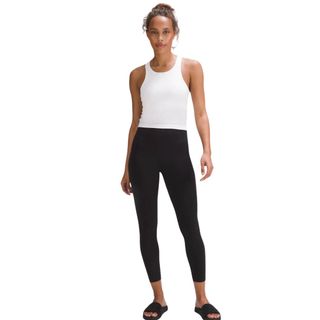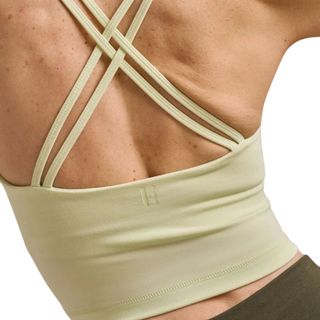Strength training has seemingly never been so popular. Everywhere you look, there's information on the benefits of strength training (spoiler: it's great), how to do it and the best equipment to use. And while we fully endorse all the above, we're on a mission to make movement more accessible, affordable, and achievable. Which is where this guide to the best bodyweight strength training exercises, all of which can be done from home, comes in.
Sure, a swanky gym membership/adjustable neoprene dumbbells/home garage-turned-weights-studio are all very well, but they're really not necessary for building strength. You might be surprised to hear that all you really need are the weights you were born with (your body weight) and a few (consistent) minutes in your day to achieve results.
Why strength train? Well, if we were to recommend only one form of exercise to do for the rest of your life, there's a strong chance that weight training would be it. Research (like this study, published in the journal Age and Ageing) shows that it not only reduces the risk of age-related muscle mass decline - known as sarcopenia - but it protects bone density, prompts long-term physical changes to our cells (meaning the positive effects of a workout last way beyond the session itself) and improves heart health, reducing the risk of cardiovascular diseases and diabetes, among other benefits.
Another plus? It's super easy to strength train from home, meaning you can access all those incredible benefits without even leaving the house - perfect for this time of year.
With this in mind, we've asked trainers for their top bodyweight strength training exercises you can do from home - consider this your complete guide. And, while we have you, check out our guide to the best home strength training workouts of all time, plus explainers on the many different types of strength training, from low impact strength training, to functional strength training, to low-intensity strength training.
No equipment? No problem - these are the best bodyweight strength training exercises you can do from home
What are bodyweight strength training exercises?
If you're new to strength training, you'll be pleased to know that bodyweight moves are reassuringly simple. Rather than relying on weights to add resistance, you'll be working against your own bodyweight - and you might be surprised by just how much of a burn you'll feel.
"Some people may be sceptical of a workout that uses no expensive machines or heavy weights, but bodyweight workouts improve strength, endurance, and power," explains trainer and and founder of Move With Emma, Emma McCaffrey. "They offer numerous benefits making them a great choice for home workouts and a convenient, effective, and accessible way to maintain physical fitness and improve your overall well-being from the comfort of your own home."
Think plank, push up and squats - performed correctly, you'll still experience a burn without a dumbbell or kettlebell.
@kayladjukic ♬ Hit Yo Rollie - 手羽先Can you build strength with bodyweight exercises?
It might seem counter-intuitive to think about strength training without weights, but rest assured that bodyweight strength training can be every bit as effective as using weights.
"Bodyweight strength training moves are equally as demanding as exercises that use dumbbells, barbells or machines," advises personal trainer and founder of TrueFit Group Training, Mandy Wong Oultram. "Building strength and muscle mass relies heavily on consistency and progressive overload, which can easily be achieved at home with bodyweight by upping the number of repetitions or sets, incorporating pauses, or slowing down the speed of the exercise - not to mention, some of the most challenging exercises are bodyweight only, such as pull-ups, press-ups, and pistol squats."
Additionally, going weightless (so to speak) allows you to focus on your form and honing technique - and we all know, great technique is crucial to reaping the best results from any move.
What is the most effective bodyweight strength exercise?
There’s no one-size-fits-all answer to this question, but our experts were unanimous that the push-up is pretty much the GOAT. "Compound exercises like push-ups and split squats are among the most effective," says trainer Michael Baah. "They work multiple muscle groups at the same time, making them great for full-body strength and endurance."
It's important to note here, however, that the 'best' exercise will vary from person to person. "The best exercise for you ultimately depends on your individual goals and fitness level," agrees McCaffrey. "If you're looking to build strength in your legs, for example, squats are really effective. For those seeking to improve core strength, planks might be a better choice."
As always. the best exercise is the one that you enjoy and will do consistently -that's when the real rewards accrue.
@justfrenchie ♬ Treacherous Twins - Drake & 21 SavageWho are bodyweight strength training exercises suitable for?
The good news just keeps coming: bodyweight strength moves are suitable for nearly everyone, no matter what stage you're at in your fitness journey.
"Bodyweight strength training is ideal for everyone, from beginners to athletes," notes Wong Oultram. "Most bodyweight exercises are low-impact and easy on the joints, making them an excellent starting point for beginners looking to build strength. For those with more experience, there are more challenging exercises like those used in calisthenics including pistol squats, handstand push-ups and pull-ups."
The takeaway? When it comes to strength, you can always level up.
What are the benefits of bodyweight strength training exercises?
As you'll have gleaned by now, the benefits of bodyweight strength training moves are myriad. Let's dig into the detail.
1. They're convenient
Looking for a workout you can do anytime, anyplace? Bodyweight strength training is your BFF. Only have five minutes? You can get a fair few squats done in that time (sorry!)
In fact, some research (such as this study, published in the journal of Exercise and Sports Sciences Reviews) shows that short, intense bursts of activity (exercise 'snacks') can be effective in improving cardiovascular health and fitness, as well as metabolic health. Since bodyweight moves can be performed without equipment, they make the perfect exercise snack.
@steph.rose.phase6 ♬ original sound - Stephanie Rose2. They boost functional fitness
Bodyweight training is arguably the best kind of functional fitness, improving our chances of aging well and living longer.
"Bodyweight strength training is excellent for improving your functional fitness," says personal trainer and founder of The Power of Mum, Nicole Chapman. "Movement patterns like squats, lunges, and planks all help build core strength, coordination, balance, stability and make daily life easier. Think lifting, carrying, walking up stairs, and independence (sitting down on a chair or toilet and standing up again) - not forgetting the best benefit of all, an increase in bone density reducing the risk of osteoporosis or a fracture if you do fall."
3. They're accessible
Cost effective and convenient, bodyweight strength training removes many of the barriers to exercise we often cite, such as expense and lack of time. They're also ideal for beginners, and being low-impact, generally safe for those with injuries or joint issues, too.
4. They boost mental wellbeing
One of the biggest benefits of strength training (in whatever form) is the mental health gains it harnesses. Trust us when we say there's no high quite like completing your first full push up - and seeing yourself gain strength, endurance and mobility is as motivating as it is mood-enhancing.
Not only this, but after all that exertion, you'll likely sleep more soundly too, creating an upward spiral of wellbeing.
@justfrenchie ♬ Hours In Silence - Drake & 21 Savage8 best bodyweight strength training exercises, according to PTs
1. Plank
What? A simple but spicy raised body hold, from forearms or hands.
Why? Love them or hate them, there's no denying that the humble plank is a strength power move. "The plank is a static exercise that strengthens the core, shoulders, and arms," says McCaffrey. "Holding a plank engages multiple muscle groups and improves overall stability, for full body strength."
How long? Beginners, aim for a 20 to 30 second hold. More practiced? Hold for 60 seconds and feel the burn.
Planks for Beginners | Bowflex® - YouTube

2. Squats
What? A funadmental human movement, our bodies are quite literally designed to squat. With feet hip wodth apart, imagine hovering over a low chair, making sure your knees don't creep in front of your ankles.
Why? A classic strength training move, and for good reason - the benefits of squats are seemingly endless. "Squats are excellent for building strength in your glutes, core, and legs," says Wong Oultram. "Since squatting is a basic movement we perform daily, mastering it can help prevent injuries when lifting items from the ground. Additionally, squats can help improve mobility in the ankles, knees, and hips."
How long? Try three sets of 10 reps to start.
Exercise Tutorial - Squat - YouTube

3. Push ups
What? Another strength training non-negotiable, and our experts' favourite move. Raise your body up from the floor using arms and core - either from your knees or a full plank position.
Why? The definition of a full body move! "A push up effectively engages your chest, arms, shoulders, back, and core simultaneously," says Wong Oultram. "By improving upper body strength and core stability, press-ups can help develop better posture and alleviate back pain. They are versatile enough for both beginners and advanced individuals since they can be modified - from box press-ups (with hips stacked over knees) to feet-elevated versions."
How long? Try three rounds of between six and eight reps.
How To Do A Push-Up | The Right Way | Well+Good - YouTube

4. Lunges
What? A surprisingly challenging move, the lunge involves stepping one foot forward and bending both knees to a 90 degree angle. Increasing how long you spend at the bottom of the lunge (the time under tension) will rev up the burn!
Why? "This exercise target all the muscles in your legs while engaging your core," says Wong Oultram. "Lunges are also beneficial for improving balance and coordination, as well as enhancing mobility in the ankles, knees, and hips, making them a good functional workout."
How long? Try three sets of six to ten lunges on each leg.
5. Dead bugs
What? A Pilates-style move, the dead bug is a great way to challenge the core without straining your neck. From a supine position, raise one leg at a time to table top, and stretch both arms in the air. Extend the opposite arm to leg, return, and repeat on the other side.
Why? "Dead bugs are fantastic for core stability and coordination," says Baah. "As you get stronger, add a leg extension or hold for longer to increase the challenge."
How long? Aim for ten reps on each side, to start.
6. Side plank with rotation
What? A gorgeously intense spinal rotation move that also targets the abs. From a side plank position, raise your top arm and then twist your torso to 'thread' the arm through the space created. Repeat on the other side.
Why? "This is my favourite core exercise," says Chapman. "It is a back-friendly core move that helps strengthen all the muscles in your back, improving posture and balance while also setting the obliques on fire! It’s important to add exercises in to your training that improve your posture and help prevent and delay the postural degenerative changes that occur as part of the natural aging process - this is a great one."
How long? Aim for six to eight rotations on each side, building up to 10 as you get stronger.
Side plank with rotation - YouTube

7. Mountain climbers
What? Starting in a full plank, bring your knees alternately into your chest, as if running in place. Make sure you keep your bottom low and don't let your knees touch the floor. Intense!
Why? "Mountain climbers are a full body strength workout combining upper body strength, core stability and lower body more cardio focussed work," says personal trainer Emma Bord. "They can be sped up to work the heart more and slowed down to focus on more controlled core strengthening - the choice is yours!"
How long? Try three sets of 10 reps.
How To Do Mountain Climbers - YouTube

8. Burpees
What? Last but by no means least, we have everyone's (least) favourite move - the burpee. But don't panic - you can modify to suit your fitness level.
Why? "The burpee is a classic move and is enormously effective for several reasons," says personal trainer and women's health coach, Edwina Jenner. "Burpees elevate your heart rate, making them a great cardio workout while building strength, too. Plus, you're working multiple muscle groups simultaneously – upper body (push-up), core (plank position), legs (squat and jump), meaning you are working on your endurance and strength simultaneously."
How long? If you can complete more than 10, we salute you.
How To Do A Burpee | The Right Way | Well+Good - YouTube

Shop MC UK's go-to strength training kit here:

Lululemon Align high rise ribbed pant
Consistently one of our favourite leggings, you can't go far wrong with a pair of Aligns. A Lululemon cult classic, this version is ribbed for extra softness - so good, you won't want to take them off. And the garnet colourway just happens to be AW24's hottest shade, naturally.

Looking for the perfect crop top for your home bodyweight session? Call off the search - BAM's mallea top is just the thing for cosy home workouts. Cut slightly longer than a bra top, it's perfect for transitioning straight to WFH once you're done, too.

After a little more coverage? This tempo tee from Free People Movement fits the bill. Sweat-wicking, breathable and stretchy, it's the ideal throw on tee - just as good on a relaxed lunch with mates as it is for your sweat session.
How can I make sure my progress doesn't plateau?
"In order to keep seeing results in strength training, it’s key to increase the challenge over time - this is known as 'pregressive overload'," says Baah. "You can achieve this by increasing the reps, adding variations, or holding the position longer. This will ensure your body is constantly challenged."
But (here's the bad news) by the same token, this will also mean that strength training never really feels any easier. You're welcome!




















 English (US) ·
English (US) ·